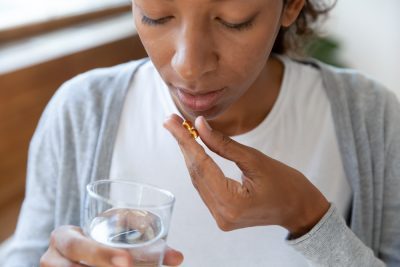The impact of vitamin D3 in breast cancer prevention has emerged as a critical focus in medical research, particularly for Black women who face higher mortality rates from this disease. Recent studies reveal that this powerful nutrient, also known as cholecalciferol, functions more like a hormone than a traditional vitamin, offering multiple layers of protection against breast cancer development and progression.
The science behind D3’s cancer-fighting power
Vitamin D3 demonstrates remarkable capabilities in supporting immune function and regulating cellular health. When properly absorbed, this nutrient transforms into its active form, calcitriol, which penetrates cell membranes and influences various biological processes crucial for cancer prevention. Research indicates that adequate vitamin D3 levels correlate with reduced breast cancer risk, particularly among Black women who often experience vitamin D deficiency due to melanin’s natural sunlight filtering properties.
7 key benefits in breast cancer prevention
- Cell regulation stands as vitamin D3’s primary cancer-fighting mechanism. Studies show it promotes healthy cell differentiation, preventing the uncontrolled growth characteristic of cancer cells. Research indicates proper D3 levels can reduce abnormal cell development by up to 30 percent.
- Immune system enhancement occurs through D3’s ability to activate key immune cells. This nutrient strengthens the body’s natural defense mechanisms, helping identify and eliminate potential cancer cells before they develop into tumors.
- Inflammation reduction results from D3’s powerful anti-inflammatory properties. Chronic inflammation often precedes cancer development, making this benefit particularly significant for prevention.
- DNA repair support helps maintain genetic stability, reducing the likelihood of mutations that can lead to cancer development. Studies show adequate D3 levels improve DNA repair mechanisms.
- Blood vessel growth regulation prevents tumors from developing their own blood supply, effectively starving potential cancer cells of nutrients they need to grow.
- Hormone balance maintenance helps regulate estrogen and other hormones that can influence breast cancer development, particularly important for hormone-responsive breast cancers.
- Treatment effectiveness improves with optimal D3 levels, enhancing the body’s response to both conventional and alternative cancer treatments.
Addressing unique needs in Black communities
Research demonstrates that Black women face particular challenges in maintaining adequate vitamin D3 levels. Melanin, while providing natural sun protection, also reduces vitamin D3 production in the skin. This biological factor, combined with limited sun exposure and dietary patterns, contributes to higher deficiency rates in Black communities.
Achieving adequate vitamin D3 levels requires a comprehensive approach combining multiple sources. Natural sunlight exposure, though important, must be balanced with skin cancer prevention. Dietary sources include fatty fish, fortified dairy products, and egg yolks. Supplements often become necessary, particularly for Black women, to achieve optimal levels.
Testing and monitoring guidelines
Regular vitamin D3 level monitoring proves essential for maintaining optimal health benefits. Healthcare providers recommend blood tests measuring 25-hydroxyvitamin D concentrations at least twice yearly. Black women should aim for levels between 30-50 nanograms per milliliter for optimal cancer-fighting benefits.
Vitamin D3 demonstrates significant potential in enhancing traditional breast cancer treatments. Research shows it can improve chemotherapy effectiveness while reducing side effects. This complementary approach offers particular promise for Black women, who often experience more aggressive forms of breast cancer.
Prevention strategies and daily practices
Creating an effective prevention strategy requires attention to multiple factors. Regular physical activity increases vitamin D3 absorption and utilization. Dietary choices should emphasize vitamin D3-rich foods and those that enhance its absorption, such as healthy fats.
Vitamin D3 deficiency signs often appear subtly, making regular monitoring crucial. Symptoms may include fatigue, bone pain, and mood changes. Black women should remain particularly vigilant about these indicators, as early intervention can prevent long-term health consequences.
Future research directions
Ongoing studies continue to uncover new connections between vitamin D3 and breast cancer prevention. Researchers focus particularly on understanding optimal dosage levels for different populations and identifying additional mechanisms through which vitamin D3 fights cancer development.
Incorporating adequate vitamin D3 into a broader health strategy requires careful planning. Working with healthcare providers to develop personalized supplementation plans ensures optimal benefits while avoiding potential complications from excessive intake.
Increasing awareness about vitamin D3’s importance in breast cancer prevention remains crucial, particularly within Black communities. Educational initiatives should address cultural factors, dietary preferences, and practical strategies for maintaining adequate vitamin D3 levels.











